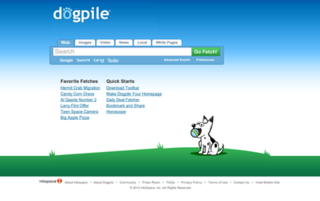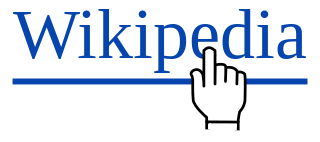
Google Search is a search engine provided and operated by Google. Handling more than 3.5 billion searches per day, it has a 92% share of the global search engine market. It is the most-visited website in the world. Additionally, it is the most searched and used search engine in the entire world.
Meta elements are tags used in HTML and XHTML documents to provide structured metadata about a Web page. They are part of a web page's head section. Multiple Meta elements with different attributes can be used on the same page. Meta elements can be used to specify page description, keywords and any other metadata not provided through the other head elements and attributes.
Spamdexing is the deliberate manipulation of search engine indexes. It involves a number of methods, such as link building and repeating unrelated phrases, to manipulate the relevance or prominence of resources indexed in a manner inconsistent with the purpose of the indexing system.
A web directory or link directory is an online list or catalog of websites. That is, it is a directory on the World Wide Web of the World Wide Web. Historically, directories typically listed entries on people or businesses, and their contact information; such directories are still in use today. A web directory includes entries about websites, including links to those websites, organized into categories and subcategories. Besides a link, each entry may include the title of the website, and a description of its contents. In most web directories, the entries are about whole websites, rather than individual pages within them. Websites are often limited to inclusion in only a few categories.
Search engine optimization (SEO) is the process of improving the quality and quantity of website traffic to a website or a web page from search engines. SEO targets unpaid traffic rather than direct traffic or paid traffic. Unpaid traffic may originate from different kinds of searches, including image search, video search, academic search, news search, and industry-specific vertical search engines.

Google Hacks: Tips & Tools for Smarter Searching is a book of tips about Google by Tara Calishain and Rael Dornfest. It was listed in the New York Times top ten business paperbacks in May 2003, considered at the time to be "unprecedented" for a technology book, and "even rarer" for the topic of search engines. The book was first published by O'Reilly in February 2002. The third edition of the book was released in 2006.
Cloaking is a search engine optimization (SEO) technique in which the content presented to the search engine spider is different from that presented to the user's browser. This is done by delivering content based on the IP addresses or the User-Agent HTTP header of the user requesting the page. When a user is identified as a search engine spider, a server-side script delivers a different version of the web page, one that contains content not present on the visible page, or that is present but not searchable. The purpose of cloaking is sometimes to deceive search engines so they display the page when it would not otherwise be displayed. However, it can also be a functional technique for informing search engines of content they would not otherwise be able to locate because it is embedded in non-textual containers, such as video or certain Adobe Flash components. Since 2006, better methods of accessibility, including progressive enhancement, have been available, so cloaking is no longer necessary for regular SEO.

Dogpile is a metasearch engine for information on the World Wide Web that fetches results from Google, Yahoo!, Yandex, Bing, and other popular search engines, including those from audio and video content providers such as Yahoo!.

A metasearch engine is an online information retrieval tool that uses the data of a web search engine to produce its own results. Metasearch engines take input from a user and immediately query search engines for results. Sufficient data is gathered, ranked, and presented to the users.

The anchor text, link label or link text is the visible, clickable text in an HTML hyperlink. The term "anchor" was used in older versions of the HTML specification for what is currently referred to as the a element, or <a>. The HTML specification does not have a specific term for anchor text, but refers to it as "text that the a element wraps around". In XML terms, the anchor text is the content of the element, provided that the content is text.
Search engine marketing (SEM) is a form of Internet marketing that involves the promotion of websites by increasing their visibility in search engine results pages (SERPs) primarily through paid advertising. SEM may incorporate search engine optimization (SEO), which adjusts or rewrites website content and site architecture to achieve a higher ranking in search engine results pages to enhance pay per click (PPC) listings and increase the Call to action (CTA) on the website.
Local search is the use of specialized Internet search engines that allow users to submit geographically constrained searches against a structured database of local business listings. Typical local search queries include not only information about "what" the site visitor is searching for but also "where" information, such as a street address, city name, postal code, or geographic coordinates like latitude and longitude. Examples of local searches include "Hong Kong hotels", "Manhattan restaurants", and "Dublin car rental". Local searches exhibit explicit or implicit local intent. A search that includes a location modifier, such as "Bellevue, WA" or "14th arrondissement", is an explicit local search. A search that references a product or service that is typically consumed locally, such as "restaurant" or "nail salon", is an implicit local search.

A search engine is a software system that finds web pages that match a web search. They search the World Wide Web in a systematic way for particular information specified in a textual web search query. The search results are generally presented in a line of results, often referred to as search engine results pages (SERPs). The information may be a mix of hyperlinks to web pages, images, videos, infographics, articles, and other types of files. Some search engines also mine data available in databases or open directories. Unlike web directories and social bookmarking sites, which are maintained by human editors, search engines also maintain real-time information by running an algorithm on a web crawler. Any internet-based content that cannot be indexed and searched by a web search engine falls under the category of deep web.
Search Engine Results Pages (SERP) are the pages displayed by search engines in response to a query by a user. The main component of the SERP is the listing of results that are returned by the search engine in response to a keyword query.

DMOZ was a multilingual open-content directory of World Wide Web links. The site and community who maintained it were also known as the Open Directory Project (ODP). It was owned by AOL but constructed and maintained by a community of volunteer editors.
Yebol was a vertical "decision" search engine that had developed a knowledge-based, semantic search platform. Based in San Jose, California, Yebol's artificial intelligence human intelligence-infused algorithms automatically cluster and categorize search results, web sites, pages and contents that it presents in a visually indexed format that is more aligned with initial human intent. Yebol used association, ranking and clustering algorithms to analyze related keywords or web pages. Yebol presented as one of its goals the creation of a unique "homepage look" for every possible search term.
Local search engine optimization is similar to (national) SEO in that it is also a process affecting the visibility of a website or a web page in a web search engine's unpaid results often referred to as "natural", "organic", or "earned" results. In general, the higher ranked on the search results page and more frequently a site appears in the search results list, the more visitors it will receive from the search engine's users; these visitors can then be converted into customers. Local SEO, however, differs in that it is focused on optimizing a business's online presence so that its web pages will be displayed by search engines when users enter local searches for its products or services. Ranking for local search involves a similar process to general SEO but includes some specific elements to rank a business for local search.

Jasmine Directory is a human-edited web directory providing websites and businesses categorized topically and regionally. It offers thirteen topic-based categories and one region-based category with hand-picked and reviewed users' suggested resources. Jasmine Directory was founded in 2009 by Pécsi András and Robert Gomboș and is headquartered in Valley Cottage, New York. It won eight prizes during 2013–14 for its editorial discretion and manually added resources. Jasmine Directory proved to be useful for SEO Google search results since they manually add about 90% of the resources.

Searx is a free and open-source metasearch engine, available under the GNU Affero General Public License version 3, with the aim of protecting the privacy of its users. To this end, Searx does not share users' IP addresses or search history with the search engines from which it gathers results. Tracking cookies served by the search engines are blocked, preventing user-profiling-based results modification. By default, Searx queries are submitted via HTTP POST, to prevent users' query keywords from appearing in webserver logs. Searx was inspired by the Seeks project, though it does not implement Seeks' peer-to-peer user-sourced results ranking.









